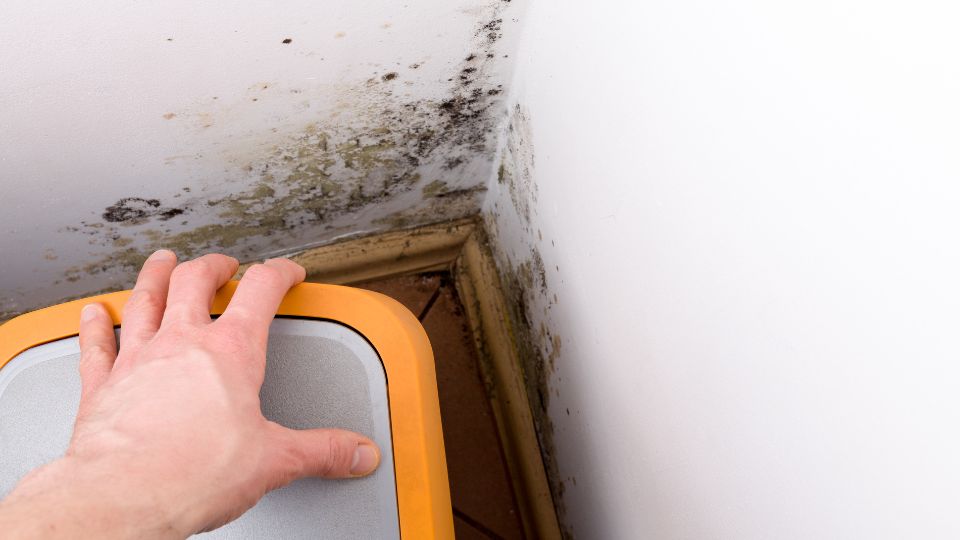- October 10, 2023
- By: Dr. Jamie Ahn
Mold toxicity, though often overlooked, can significantly impact our health and well-being. As a functional medicine doctor, I have encountered numerous cases where mold exposure has been a hidden culprit behind various health issues.
In this blog, we will delve into the potential health consequences of mold toxicity and provide you with ten actionable steps you can take today to safeguard your health.
Understanding Mold ToxicityMold is a type of fungus that can grow in damp, dark, and poorly ventilated areas, such as basements, bathrooms, and under sinks. When mold spores are inhaled or come into contact with the skin, they can lead to a range of health issues, particularly for individuals with sensitivities or compromised immune systems.
The severity of these effects depends on various factors, including the individual’s immune system, genetic predisposition, and duration of exposure.
Mold and mycotoxins are closely connected, as mycotoxins are toxic substances produced by certain types of molds. Mycotoxins are secondary metabolites that molds release into their environment as a defense mechanism. These toxic compounds are primarily intended to inhibit the growth of other organisms competing for the same resources, but unfortunately, they can also harm humans and animals when exposed.
Mold Production of MycotoxinsMycotoxins are produced by various molds belonging to the genera Aspergillus, Penicillium, Fusarium, and Stachybotrys, among others. These molds thrive in damp and humid environments, such as water-damaged buildings, flooded areas, and food storage facilities.
When conditions are favorable for mold growth, they release mycotoxins into the air or onto surfaces where they can be inhaled, ingested, or come into contact with the skin.
Why are some people affected by mold and others aren’t?The varying responses to mold exposure among individuals can be attributed to several factors, including genetics, immune system function, overall health status, duration and intensity of exposure, and the specific type of mold and mycotoxins involved.
Here are some key reasons why some people are more affected by mold, while others may not exhibit any noticeable symptoms:
1. Genetic Predisposition: Genetic factors play a significant role in determining an individual’s susceptibility to mold-related health issues. Certain genetic variations can make some people more sensitive to mold toxins, like if you have the MTHFR gene mutation, while others may have natural defenses that allow them to tolerate mold exposure better.
Mold Toxicity and MTHFR Mutation
The MTHFR gene provides instructions for making an enzyme called methylenetetrahydrofolate reductase, which is involved in the body’s methylation process. Methylation is a critical biochemical pathway responsible for detoxifying various substances, including mycotoxins produced by mold. Some studies suggest that individuals with certain MTHFR gene mutations might have reduced methylation capacity, potentially affecting their ability to detoxify mycotoxins adequately.
2. Immune System Response: The immune system is our body’s defense mechanism against foreign invaders, including mold spores and mycotoxins. Individuals with compromised immune systems, such as those with autoimmune disorders, chronic illnesses, or undergoing immunosuppressive treatments, may be more susceptible to mold-related health effects.
3. Allergies and Sensitivities: Pre-existing allergies or sensitivities to mold or other allergens can lead to more severe reactions when exposed. Individuals with conditions like allergic rhinitis, asthma, or atopic dermatitis may experience exacerbated symptoms in the presence of mold.
4. Duration and Intensity of Exposure: The longer and more intense the exposure to mold and mycotoxins, the higher the likelihood of developing health issues. Prolonged exposure in environments with high mold concentrations can lead to a greater impact on health.
5. Health Status: Overall health plays a crucial role in determining an individual’s response to mold exposure. Those with pre-existing health conditions or weakened immune systems may experience more severe consequences.
6. Individual Tolerance: Just like with any environmental exposure, individual tolerance levels vary. Some people may have a higher tolerance to mold and its toxins, and therefore, they may not experience noticeable symptoms even when exposed.
7. Type of Mold and Mycotoxins: Different types of molds produce various mycotoxins with varying degrees of toxicity. Some molds produce more harmful mycotoxins, while others may produce less harmful ones. The specific mold species and the types of mycotoxins present can influence the severity of health effects.
Symptoms of Mold Toxicity
- Respiratory Issues: Mold spores can irritate the respiratory tract, leading to symptoms such as coughing, wheezing, nasal congestion, and throat irritation.
- Allergic Reactions: Mold can trigger allergic responses in sensitive individuals, causing symptoms like sneezing, watery eyes, and skin rashes.
- Neurological Symptoms: Prolonged mold exposure may contribute to neurological issues, including headaches, difficulty concentrating, and memory problems.
- Fatigue and Weakness: Mold toxicity can lead to chronic fatigue and a general feeling of weakness, impacting daily life and productivity.
- Digestive Disturbances: Mold exposure might be associated with gastrointestinal problems, such as bloating, diarrhea, and abdominal pain.
- Skin Irritations: Direct contact with mold or mold-infested materials may cause skin reactions, such as itching and redness.
- Immune System Suppression: Mold toxicity can weaken the immune system, making individuals more susceptible to infections and other illnesses.
- Mood Swings and Depression: Mold exposure has been linked to changes in mood, increased anxiety, and even depressive symptoms.
- Chronic Inflammation: Prolonged exposure to mold can trigger chronic inflammation, which has been linked to numerous chronic diseases.
- Autoimmune Disorders: Some studies suggest that mold exposure could contribute to the development or exacerbation of autoimmune conditions in susceptible individuals.
How Do Functional Medicine Doctors Address Mold Toxicity?Functional medicine doctors take a comprehensive and individualized approach to address mold toxicity. Their goal is to identify the root causes of health issues and develop personalized treatment plans to support the body’s natural healing processes.
When it comes to mold toxicity, functional medicine doctors typically follow these steps:
1. Detailed Patient History: The functional medicine doctor will take a detailed patient history to understand the individual’s symptoms, exposure to mold, and any pre-existing health conditions. This information helps them identify potential connections between mold exposure and health issues.
2. Environmental Assessment: The doctor may inquire about the patient’s living and working environments to assess potential mold exposure sources. They may also recommend environmental testing to identify the presence of mold and mycotoxins in the surroundings.
3. Comprehensive Testing: Functional medicine doctors use various laboratory tests to assess the patient’s overall health status, immune function, detoxification capacity, and potential mold-related biomarkers. These tests may include blood tests, urine tests, and specialized functional medicine panels.
4. Individualized Treatment Plan: Based on the patient’s history, test results, and unique health needs, the functional medicine doctor will create an individualized treatment plan. This plan may include lifestyle modifications, dietary changes, nutritional supplements, and targeted therapies.
5. Mold Exposure Management: The doctor will guide the patient in identifying and avoiding mold exposure sources, whether at home or work. This may involve improving indoor air quality, addressing water leaks, and creating a mold-free living environment.
6. Detoxification Support: Supporting the body’s natural detoxification pathways is crucial in addressing mold toxicity. The doctor may recommend specific nutrients, such as glutathione, antioxidants, and liver-supportive supplements, to aid in detoxification.
7. Immune System Support: Strengthening the immune system is essential for combating mold-related health issues. Functional medicine doctors may recommend immune-supportive supplements and lifestyle strategies to enhance immune function.
8. Gut Health Restoration: Mold toxicity can disrupt gut health, leading to issues like leaky gut syndrome. Functional medicine doctors focus on restoring gut health through appropriate dietary changes and targeted gut-healing protocols.
9. Symptom Management: Functional medicine doctors will address the specific symptoms associated with mold toxicity, such as respiratory issues, neurological symptoms, and allergies, using a combination of natural therapies and conventional medicine when necessary.
10. Follow-up and Monitoring: Regular follow-up visits allow the functional medicine doctor to assess the patient’s progress, adjust the treatment plan as needed, and ensure ongoing support for long-term health improvement.
Functional medicine doctors take a patient-centered, holistic approach to address mold toxicity. By identifying and addressing the root causes of health issues and supporting the body’s natural healing processes, we strive to help patients recover from mold-related health problems and optimize overall well-being. If you suspect mold exposure and related health issues, consult with Dr. Jamie Ahn, Functional Medicine Doctor, so she can provide valuable insights and guidance for your personalized care.
In the meantime, here are ways you can prevent mold toxicity in the first place and/or begin your healing journey.
10 Steps to Address Mold Toxicity Today
- Identify Water Intrusion: Inspect your living and work spaces for any signs of water leaks, roof leaks, or plumbing issues. Address and repair these sources promptly.
- Improve Ventilation: Ensure proper ventilation in bathrooms, kitchens, and basements to reduce humidity and minimize mold growth.
- Use Dehumidifiers: Invest in a good-quality dehumidifier to maintain indoor humidity levels below 50%.
- Clean Mold Spots: If you find mold, clean the affected areas immediately using a mixture of water and vinegar or a mild detergent. Wear appropriate protective gear during the cleaning process.
- Get Professional Inspection: If you suspect extensive mold growth or are experiencing unexplained health issues, seek the assistance of a professional mold inspector or environmental consultant.
- Air Purifiers: Consider using high-efficiency particulate air (HEPA) filters to remove mold spores and other allergens from the air.
- Detoxify Your Body: Support your body’s natural detoxification processes through a healthy diet, regular exercise, and staying adequately hydrated.
- Optimize Nutrition: Consume a nutrient-dense diet rich in antioxidants and immune-supportive nutrients to bolster your body’s defenses.
- Strengthen Immune Function: Consider immune-supporting supplements under the guidance of a qualified healthcare practitioner.
- Seek Functional Medicine Support: Consult with a functional medicine doctor who can conduct comprehensive testing, identify underlying health issues, and provide personalized treatment plans to address mold toxicity and its consequences.
Book a Call with a Mold Toxicity Functional Medicine Doctor in CTIf you or a loved one is experiencing symptoms of mold toxicity and seeking a holistic approach to healing, consider booking a call with a Mold Toxicity Functional Medicine Doctor in Connecticut. They can offer expert guidance and support in navigating the journey towards better health and overall well-being in the presence of mold toxicity.
Remember, mold toxicity can manifest in various symptoms and have a significant impact on your health. With the right approach, it is possible to manage these symptoms and regain vitality and balance in your life. Functional medicine may hold the key to unlocking your path to wellness, providing personalized strategies to address mold toxicity and promote optimal health.

